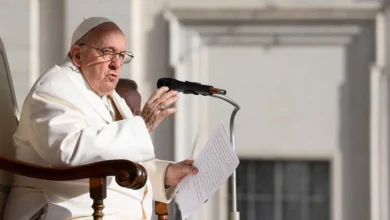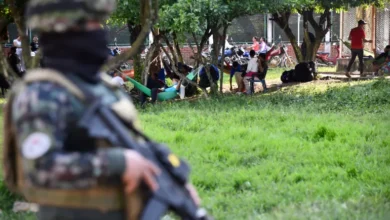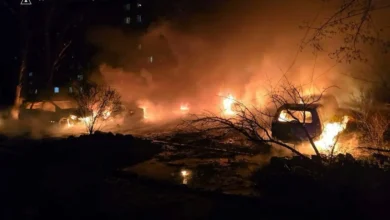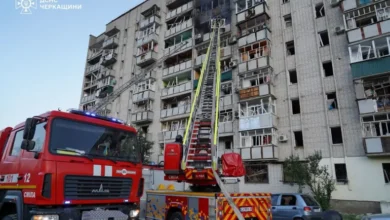One-star ratings and threats: How review-bombing is shaping the Gaza war
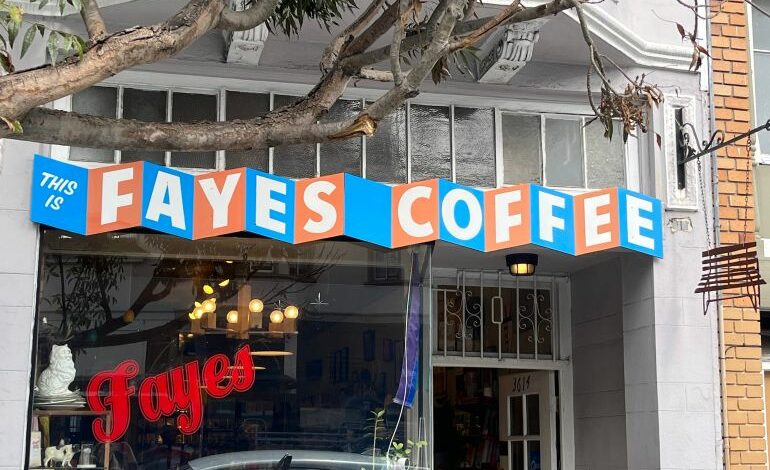
Every morning, when the coffee shop and art space Fayes opens its doors in San Francisco’s Mission District, an employee writes a message on the chalkboard perched outside.
Usually, the message is funny or a plug for coffee and art. But last month, as the war in Gaza erupted, a different message appeared: “Solidarity with Gaza. From the river to the sea, Palestine will be free.”
Fayes co-owner Michael McConnell was out of town at the time the message went up. But when his phone started buzzing with notifications, he knew something was wrong.
One-star reviews were pouring in on popular websites like Yelp. Some complained about “dirty looks” from staff, others about bad table service.
But McConnell was suspicious. Fayes does not have tables at all. And a lot of the commenters appeared to be posting from other parts of the United States, as far away as New York and Michigan.
That’s when it dawned on him: Fayes was in the middle of a review-bombing.
Often used to describe coordinated online efforts to bombard individuals and organisations with criticism, review-bombing can have devastating repercussions, particularly for small businesses with few resources to weather the onslaught.
McConnell added that it was disheartening that the woman did not think through what her posts would do to his business or its employees.
But he remains optimistic. Google and Yelp have taken action to remove the review-bombing posts, and McConnell said he had a “lovely” conversation with someone who got in touch over Instagram to talk about the chalkboard message and its aftermath.
He figures tourists might be turned off by the bad online ratings, but his regular customers will continue to rally around the coffee shop, known for its artwork and wall of rental DVDs.
Melissa Ryan, a consultant focused on combatting extremism and toxicity online, said review-bombing participants are aware of the power of their words.
But she believes the responsibility should lie with companies like Yelp and Google to prevent bullying and crack down on fake reviews.
“It is on the platforms to be putting more energy and resources into that and to be thinking about their policies and be enforcing them,” Ryan said. “It’s one thing to be complaining about wait service that doesn’t exist. It’s another to call someone a terrorist and make threats.”
Surviving with community support
Ten blocks away from Fayes, the Palestinian bakery and restaurant Reem’s likewise faced protest and review-bombing when it opened its first brick-and-mortar location in the nearby city of Oakland in 2017.
Co-founder Zaynah Hindi said she and chef Reem Assil envisioned their restaurant as a welcoming place, branding it with the motto, “Arab street food made with California love.”
But within a week of opening, the backlash began. “Google and Yelp were flooded with one-star reviews,” Hindi recalled as she sat at a table inside the bakery’s Mission District location.
“Some were just blatantly like, ‘This is a terrorist establishment. There’s blood of children in their food,’ stuff like that. Then there are those who tried to disguise it, like, ‘I went there, and their food was terrible,’ and listed products that we don’t actually even serve.”
Many commenters took issue with a painting inside the restaurant that depicted the Palestinian activist Rasmea Odeh, who was convicted in Israel of participating in a deadly bombing but maintains she confessed under torture.
The online reactions, however, included threats against individual staff members, particularly Assil, the chef and owner, who was pregnant at the time.
“Reem received very vile messages that I don’t even want to repeat, but they were very violent,” Hindi explained.
But Hindi credits the community with keeping the bakery open. When protesters appeared outside the store, supporters showed up and linked arms to create safe passage for Reem’s workers and customers, she said.
Now, with tensions over the war in Gaza high, Hindi hopes the restaurant can offer a safe space in return, particularly for Palestinians struggling with the scale of the violence.
“In the last few weeks, Reem and I as Palestinians were absolutely devastated and feeling paralysed to be witnessing the genocide of our people in front of our very eyes,” Hindi said. “That is just heartbreaking.”
She added she and her colleagues have no intention of closing their doors, no matter the backlash.

